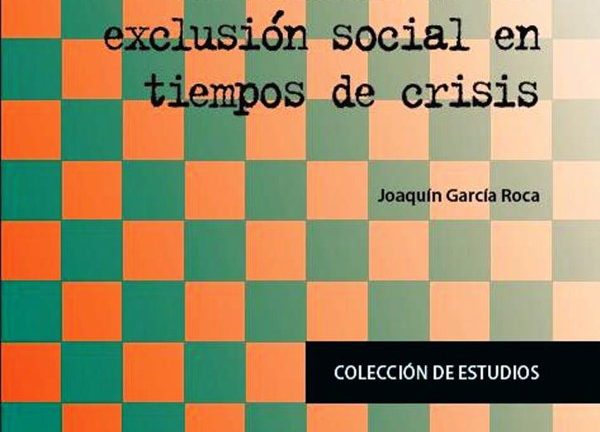
Reinvention of the social exclusion in times of crisis
Joaquín García Roca
Cáritas Española Editores and Fundación FOESSA, 2012
The global crisis is ongoing, and has not done anything more than begin, affecting all the dimensions of what is real.
Emits different signals, next to which there are projecting jointly and severally liable for the common future of humanity: sends signals to the world economic and financial, and are demanding the recovery of the production, consumption and finance, and the recomposition of the excesses and corruptions of the economic relations. It is also proposed to correct the failures so that the system will function again. Their basic concerns are how to recover from the recession, regain competitiveness and to achieve greater effectiveness and efficiency in the economic and financial relations. Lately, however, there has been expanded concern for “the possible and most feared of social unrest and incipient riots caused by the crisis”. The political power also sets out the turbulence that undermines social cohesion.
The emitted signals to the world of culture make them rethink the role of the individual in the society. There is a culture of accommodating, of those who surrender to the thickness of the crisis, with a culture of outrage at the perpetrators of the financial crash. Sends signals also to the world of social work, which unfolds in civic organizations, associations of citizens in social movements and in voluntary services, demonstrating the weaknesses of the social sector.
Recreate the solidarity in the interior of the crisis is to produce a hybridization with the world economic, political, cultural and social. The major contributions of solidarity are summarized in a regime that pays attention to the losers of the crisis, claimed the idea of alternatives and produces a transition time that causes the change. The crisis has changed the playing field of social action to the extent that it has overflowed as a sectoral system and has connected to the economy, politics and culture to be able to act in contexts of emergency and scarcity and the prevention on the political and economic, and awareness-raising via the cultural
The central idea of the book is developed from the simultaneity of the destructive power of the crisis and of his power of reconstruction, seen from the events that occur in the scope of the exclusions.
In this study we analyze the impact of the crisis on the social action, which forces you to explore and recreate their own place, their functions, their actors, times and scales. It also raises a series of questions for us, questions about what to do when faced with the impotence that produces the crisis and the ease with which it creates lives that have been evicted and losing. This requires new conceptualizations and practices of inclusion.
The crisis has also revealed the creation of a unique world that is interconnected by interests, issues and causes. Social action can take the transition to make in this situation.
Finally, we explore the transformation of consciousness through the border and through the reconstruction of solidarity.
The output, therefore, need to think radically profound transformations, the new sensors, the new concept maps to that small alterations can give rise to seizures and long-range.
.
Index
| Prologue: “Reinvention” of the exclusion, re-invented from the exclusiónPresentaciónCapítulo 1. Reinvention of the action socialCapítulo 2. The production policy of the impotenciaCapítulo 3. Cultural production of the adicciónCapítulo 4. Social production of vulnerabilidadCapítulo 5. Production of the social bond world
Chapter 6. Time of transitions techniques Chapter 7. Challenges of the borders Chapter 8. Solidarity, ethics and law Epilogue. Reboot the system, values, and foundational myths Bibliography |
Fragment (p. 1-36)
Buy Reinvention of social exclusion in times of crisis
For more information: [email protected]
.
